- Promotion of reconstruction support for the Great East Japan Earthquake
and Tsunami in addition to the academic year plan - Major Project Achievements for Academic Year 2011
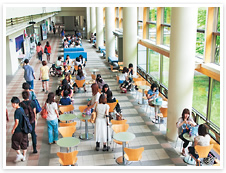 The Great East Japan Earthquake and Tsunami, which occurred on March 11, 2011, came during the initial year of our second phase midterm plan. In response to the enormous damage caused by the disaster and the large environmental changes that accompanied the damage, we worked to add support for disaster recovery efforts to the preliminarily instituted academic plan.
The Great East Japan Earthquake and Tsunami, which occurred on March 11, 2011, came during the initial year of our second phase midterm plan. In response to the enormous damage caused by the disaster and the large environmental changes that accompanied the damage, we worked to add support for disaster recovery efforts to the preliminarily instituted academic plan.
We ranked 6 issues as part of our university-wide plan and moved ahead with the following approach to achieve our midterm goals.
(1) Strategic acquisition of new students that have a strong sense of purpose and passion for learning
●Clarification of admissions policies
We conducted a review to clarify each faculty’s admissions policies in connection to the organization and implementation of degree conferment policies and educational courses to be formulated in 2012.
●Focus on issues related to the current entrance exam system
In response to new curriculum guidelines for high schools, we undertook a review and made announcements regarding the subjects used by the university entrance examination center. Additionally, we implemented a “special disaster selection” method in order to provide the chance to take the university’s entrance examinations to high school students affected by the Great East Japan Earthquake and Tsunami, which 22 out of 39 examinees successfully passed.
●Formulation of new policies for high school-university project collaborations
For Open Campus, the university covered the cost of 16 buses to transport high school students from the disaster zone, resulting in a total of 2500 participants for the event, a 700-person increase from the previous year. Additionally, 36 students were delegated as Campus Attendants who conducted activities throughout the year, such as university tours for high school students and promotional visits to alma maters. We also offered enhanced opportunities for exchange, such as class visits in the high schools by teaching staff, and roundtables with the Principals Association.
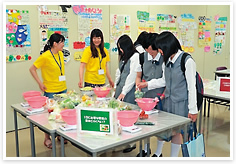 Visitors to Open Campus
Visitors to Open Campus
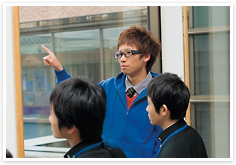 Student ‘Campus Attendants’
Student ‘Campus Attendants’
(2) Execution of a systematic and consistent educationprogram
●Preparations for the opening of the Center for the Planning of Higher Education (provisional name)
As we move toward the opening of the Center for Higher Education Planning (provisional name) in 2013, a master concept review committee was established and tasked with conducting dialogues through seminars and inspections of other universities concerning issues related to common education at present, the state of basic education, systems, etc.
●Clarification of diploma policies
Each department laid the groundwork for degree conferment policies (diploma policies) and educational course organization and implementation policies (curriculum policies), and these were gathered together under a university-wide policy document by March, 2012.
●Examination of the state of student independent study and practical education
We consulted with practical training instructors to discuss their roles. In addition, we conducted a re-examination of the specialized education required to acquire investigative and analytical methods through practical training and reviewed the system aimed at implementing regional business site visits. Further to this, graduation work was begun on projects closely related to the earthquake disaster and the region.
●Organizing tasks and making decisions toward the introduction of the GPA system across the university
The academic assessment system working group has proceeded with its review of the new academic assessment system centered on a 5-stage evaluation and the introduction of the GPA system by investigating case examples and conducting FD training workshops across the university. It was decided that university-wide implementation will start in 2012.
(3) Supporting the development of student employability and promotion of employment within the prefecture
●Promote the introduction of IPU-E Map into the university
Each department has defined ‘employability’. Now, with respect to plans for the gradual introduction of the IPU-E Map, all first- to third-year students from the Faculty of Policy Studies are targeted for commencing operations, while within the Faculty of Software and Information Science and Morioka Junior College, we have begun to examine how to construct an employability self-evaluation system.
●Full-scale launch of the IPU-E project
Three projects (“Business Challenge Project”, “FUKKO Girls* (Reconstruction Girls)” and “Natayacho Tours by Iwate Prefectural University students”) were chosen to be part of the IPU-E project, and they have reported on their efforts to develop employability as well as the results of their activities. The “FUKKO Girls*” group, which has a special interest in supporting those affected by the disaster, received second prize at the 2012 Working People Basic Skills Competition Grand Prix Finals.
●Break ground with prefectural businesses, etc. on the development of new places of employment
We have built networks with businesses, and developed students’ understanding of business and places of employment through various activities such as conducting tours of local businesses, holding information sessions with prefectural health institutions with an emphasis on hospitals, introducing an IPU employment supporter system, and holding an employability symposium. In addition, new host businesses have begun offering courses for civil servants, and the results of civil servant exam preparation have strengthened since the Faculty of Policy Studies established the Kouken Center for Government, a local public human resources research center. With 54 individuals from across the country, 2011 saw the highest ever number of successful civil servant exam takers.
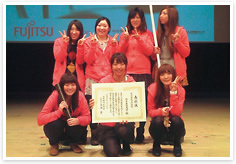 FUKKO Girls* (Reconstruction Girls)
FUKKO Girls* (Reconstruction Girls)
competing in the Working People Basic Skills Competition Grand Prix Finals
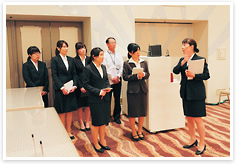 A Morioka hotel hosting a workplace site visit
A Morioka hotel hosting a workplace site visit
(4) Carrying out research that is valuable to the region and publically disclosing the results
●Efforts to improve the scientific research grant application rate
We have pursued research that supports reconstruction from the Great East Japan Earthquake and Tsunami so that teaching staff from each of our departments can demonstrate their expertise. In addition, we founded the Wakate Younger Researchers Step-up Research Fund, a grant-in-aid for scientific research fund that delivered assistance to 26 applicants.
●Make public disclosure of research results obligatory, and increase opportunities to provide information to the citizens of the prefecture
Regarding the allocation of academic research funds, we proceeded towards the establishment of a system of rules that stipulates the public disclosure of research results. Additionally, through public courses, forums and compilations of reports on research results, we have made efforts to inform the community outside of the university regarding each department’s disaster recovery support activities.
●Re-examination of the peer review system and other enhancements of exterior evaluations
We have re-examined (the rules concerning) peer review of academic research results in an effort to increase both the quality and the quantity of academic publications.
(5) Strengthening industry-university-government collaborations and making full use of think-tank functionality
●Establishment of i-MOS and promotion of joint research and high-level engineer development
We established the Iwate Monozukuri and Software Integration Technology Center (i-MOS). In addition to launching joint research with businesses that are utilizing the Center, we also ran 16 training sessions for the development of 136 engineers.
●Establishment of Regional Policy Research Center and preparation of a think-tank system
We established the Regional Policy Research Center and made research on disaster recovery its priority. A midterm report has been published about 15 research projects launched as a result of on-campus open recruitment.
(6) Development of teaching staff who contribute to the realization of the ideals of the university
●Improvement of FD implementation mechanism and procedures
At university-wide FD training workshops, where we have deepened our shared awareness of the introduction a new performance evaluation system to be introduced in 2012, we have carried out FD activities that bring to life the characteristics of each department and make the most of reciprocal course auditing among teaching staff.
●Improve the abilities of office staff through a unique university training system
We upgraded and expanded office staff training and have begun examining the formulation of an Office Staff Abilities Development Plan (provisional name).
●Efforts to test and then fully implement the teaching staff evaluation system
We formulated and conducted trials on an outline of the new teaching staff performance evaluation system. We have concluded that full-scale implementation can be handled in 2012.
●Formulation of a fixed number management plan for teaching staff
A fixed number management plan for teaching staff until the end of the final year of the midterm plan period was formulated, and we have been managing personnel based on this plan.



